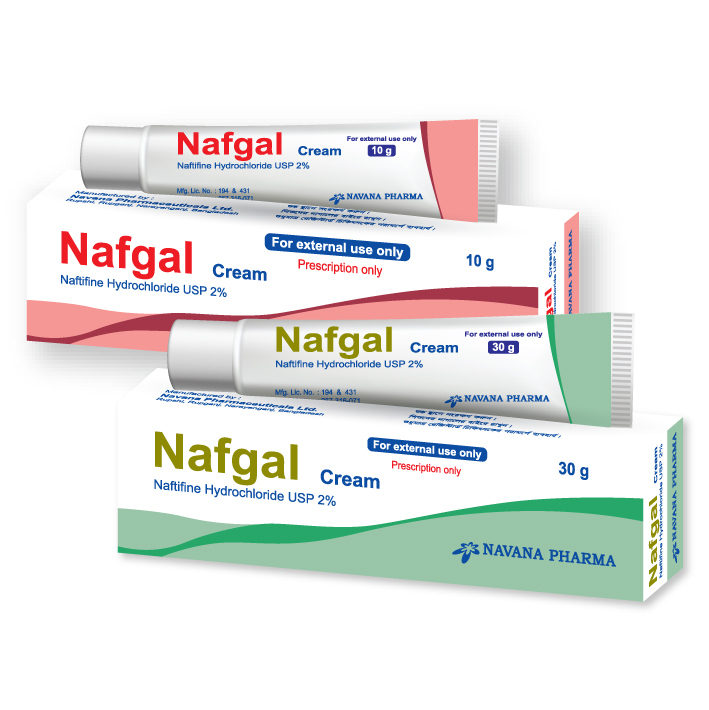Nafgal Uses, Dosage, Side Effects and more
Although the exact mechanism of action against fungi is not known, naftifine appears to interfere with sterol biosynthesis by inhibiting the enzyme squalene 2,3-epoxidase. This inhibition of enzyme activity results in decreased amounts of sterols, especially ergosterol, and a corresponding accumulation of squalene in the cells.
Nafgal is a synthetic, broad spectrum, antifungal agent and allylamine derivative. The following in vitro data are available, but their clinical significance is unknown. Nafgal has been shown to exhibit fungicidal activity in vitro against a broad spectrum of organisms including Trichophyton rubrum, Trichophyton mentagrophytes, Trichophyton tonsurans, Epidermophyton floccosum, and Microsporum canis, Microsporum audouini, and Microsporum gypseum; and fungistatic activity against Candida species including Candida albicans. However it is only used to treat the organisms listed in the indications.

| Attribute | Details |
|---|---|
| Trade Name | Nafgal |
| Availability | Prescription only |
| Generic | Naftifine |
| Naftifine Other Names | Naftifin, Naftifina, Naftifine, Naftifinum |
| Related Drugs | clotrimazole topical, ketoconazole topical, terbinafine, miconazole topical, Lamisil |
| Weight | 2% |
| Type | Cream |
| Formula | C21H21N |
| Weight | Average: 287.3981 Monoisotopic: 287.167399677 |
| Groups | Approved |
| Therapeutic Class | Topical Antifungal preparations |
| Manufacturer | Navana Pharmaceuticals Ltd |
| Available Country | Bangladesh |
| Last Updated: | January 7, 2025 at 1:49 am |
Uses
Nafgal cream is an allylamine antifungal used for the treatment of interdigital tinea pedis, tinea cruris, and tinea corporis caused by the organism Trichophyton rubrum
Nafgal is a synthetic, broad spectrum, antifungal agent and allylamine derivative. The following in vitro data are available, but their clinical significance is unknown. Nafgal has been shown to exhibit fungicidal activity in vitro against a broad spectrum of organisms including Trichophyton rubrum, Trichophyton mentagrophytes, Trichophyton tonsurans, Epidermophyton floccosum, and Microsporum canis, Microsporum audouini, and Microsporum gypseum; and fungistatic activity against Candida species including Candida albicans. However it is only used to treat the organisms listed in the indications.
Nafgal is also used to associated treatment for these conditions: Tinea Corporis, Tinea Cruris, Tinea Pedis
How Nafgal works
Although the exact mechanism of action against fungi is not known, naftifine appears to interfere with sterol biosynthesis by inhibiting the enzyme squalene 2,3-epoxidase. This inhibition of enzyme activity results in decreased amounts of sterols, especially ergosterol, and a corresponding accumulation of squalene in the cells.
Dosage
For topical use only. Nafgal Cream is not for ophthalmic, oral, or intravaginal use.Apply a thin layer of Nafgal Cream once-daily to the affected areas plus a ½ inch margin of healthy surrounding skin for 2 weeks
How Long Does It Take to Work?
How Long Does It Take to Work? see here Nafgal
Side Effects
The most common adverse reaction (≥1%) is pruritus.
Precaution
If redness or irritation develops with the use of Nafgal Cream treatment should be discontinued.
Food Interaction
No interactions found.Elimination Route
Following single topical applications of 3H-labeled naftifine gel 1% to the skin of healthy subjects, up to 4.2% of the applied dose was absorbed.
Half Life
Approximately 2 to 3 days following topical administration.
Elimination Route
Nafgal and/or its metabolites are excreted via the urine and feces with a half-life of approximately two to three days.
Pregnancy & Breastfeeding use
Pregnancy Category B. There are no adequate and well-controlled studies of Nafgal Cream in pregnant women. Because animal reproduction studies are not always predictive of human response, Nafgal Cream should be used during pregnancy only if the potential benefit justifies the potential risk to the fetus.
Nursing Mothers: It is not known whether this drug is excreted in human milk. Because many drugs are excreted in human milk, caution should be exercised when Nafgal Cream is administered to a nursing woman.
Special Warning
Pediatric Use: The safety and effectiveness of Nafgal Cream have been established in the age group 12-17 with interdigital tinea pedis and tinea cruris. Safety and effectiveness in pediatric patients <12 years of age have not been established.
Geriatric Use: Clinical studies of Nafgal Cream did not include sufficient numbers of subjects aged 65 and over to determine whether they respond differently from younger subjects.
Storage Condition
Store at 25°C; excursions permitted to 15-30°C
Innovators Monograph
Nafgal contains Naftifine see full prescribing information from innovator Monograph, MSDS, FDA label



